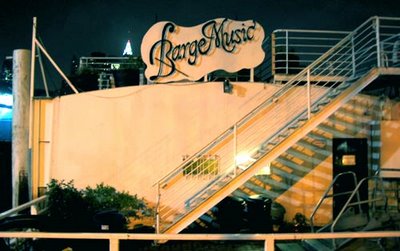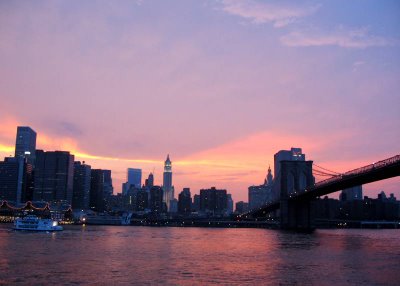 On Saturday, after visits to the Pierpont Morgan Library and the Met's Raphael exhibit, we took in a concert. It's late July, and most New York concert-goers have long since bailed out of the city for Tanglewood and other festivals. However, our schedule coincided perfectly with a concert in a venue I have heard about but never visited, Bargemusic. In the 1970s, violinist Olga Bloom had the idea to purchase a river barge (formerly used to transport coffee through New York Harbor), moor it permanently at Fulton Ferry Landing (at the foot of the Brooklyn side of the Brooklyn Bridge), and host a concert series inside it. You walk over a gangplank to get onto the Barge, where you rock with the waves churned up by the tug boats and large vessels that cruise by (the piano has to be held in place with wheel blocks to keep it from rolling around), and listen to good music while the Manhattan skyline turns rose in the sunset. Enough people have enjoyed the experience over the years for the Barge to have a long list of donors and enough supporters nearly to fill the seats on a July Saturday night.
On Saturday, after visits to the Pierpont Morgan Library and the Met's Raphael exhibit, we took in a concert. It's late July, and most New York concert-goers have long since bailed out of the city for Tanglewood and other festivals. However, our schedule coincided perfectly with a concert in a venue I have heard about but never visited, Bargemusic. In the 1970s, violinist Olga Bloom had the idea to purchase a river barge (formerly used to transport coffee through New York Harbor), moor it permanently at Fulton Ferry Landing (at the foot of the Brooklyn side of the Brooklyn Bridge), and host a concert series inside it. You walk over a gangplank to get onto the Barge, where you rock with the waves churned up by the tug boats and large vessels that cruise by (the piano has to be held in place with wheel blocks to keep it from rolling around), and listen to good music while the Manhattan skyline turns rose in the sunset. Enough people have enjoyed the experience over the years for the Barge to have a long list of donors and enough supporters nearly to fill the seats on a July Saturday night.Fred Kirshnit, Good Humor on The River (New York Sun, July 25) Ben Finane, String quartets roll and rock (Newark Star-Ledger, July 21) |
The absence of a collective name hardly matters, since they had selected such an interesting program and played it with a rawness and verve that was gripping in the Barge's intimate space. Less than 150 people can squeeze into the air-conditioned cabin area of the Barge, and from the small stage area in front of what was the pilot's window the musicians sound thrillingly close. The improvised folk music of the Roma, or gypsies, was the connecting thread for the first half, beginning with Haydn's C major quartet (op. 54, no. 2). In the second movement (Adagio), then first violinist Colin Jacobsen dirtied up the ecstatic parlando solo, which he later described as a written-down improvisation. The group favors a direct sound, with generally very little vibrato, that plays quite well in a small setting like the Barge. In the Haydn, the group chose exciting fast tempi and played the joking qualities of the rondo to the hilt. Colin Jacobsen impressed most with the accuracy and taste of his playing.
 To pair that with a rather different appropriation of folk materials, Bartók's second quartet, was a worthy idea. By comparison to other performances -- I heard the piece this spring from the Takács Quartet -- this was one of the most barbaric and violent performances I have experienced, especially the warlike second movement but also in the foghorn-like bellowing of viola and cello in the opening of the third movement. It was a gutsy rendition, creating stunning visceral impact, leading us into an intermission on the top of the Barge, watching the multichromatic spectacle of sunset over the East River.
To pair that with a rather different appropriation of folk materials, Bartók's second quartet, was a worthy idea. By comparison to other performances -- I heard the piece this spring from the Takács Quartet -- this was one of the most barbaric and violent performances I have experienced, especially the warlike second movement but also in the foghorn-like bellowing of viola and cello in the opening of the third movement. It was a gutsy rendition, creating stunning visceral impact, leading us into an intermission on the top of the Barge, watching the multichromatic spectacle of sunset over the East River.| Available at Amazon: Philip Glass, String Quartets Nos. 2-5, Kronos Quartet (released on February 7, 1995) |
Unfortunately, the concert ended on the weakest performance, Mozart's E-flat quartet (K. 428), one of the six quartets dedicated as a group to Haydn. The other quirk of Gandelsman's technique is an overuse of portamento (another gypsyesque touch? listening to too much Heifetz?), which was much less annoying to my ear when he was playing second violin. This was particularly out of place, it seems to me, in the Mozart, notably in unison passages in which none of the other players was sliding between notes in the same way. Overall, the Mozart had the least rehearsed and most labored sound on the program, with a few problems of intonation, accuracy, and ensemble. Again the tempi tended toward brisk, perhaps a bit troppo in the first movement (Allegro, ma non troppo), but to impressive effect in the last movement (Allegro vivace). At the final pause in the rondo's main theme, the added exchanges between instruments ticked away to nothing like a clock winding down, which brought a smile to my face.
On your next trip to New York, if you are looking for an alternative place to hear a concert, Bargemusic combines good performances with spectacular views of the Manhattan skyline. Plus, as you leave, Olga Bloom shakes the hand of every member of the audience. Adding to that warm atmosphere, the Barge actually has a fireplace, which I hope they are able to light up with a fire in the winter.
No comments:
Post a Comment